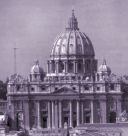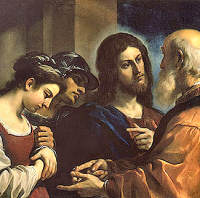» Enjoy our Liturgical Seasons series of e-books!
Now there were some Greeks among those who had come up to worship at the feast. They came to Philip, who was from Bethsaida in Galilee, and asked him, "Sir, we would like to see Jesus." Philip went and told Andrew; then Andrew and Philip went and told Jesus (John 12:20-22).
Previously called "Passion Sunday", this Sunday marks the beginning of Passiontide, a deeper time of Lent. This is the third Sunday of the scrutinies for the preparation of adult converts, and the final Sunday of Lent before the beginning of Holy Week. The Liturgy of the Word of this day speaks of re-creation, resurrection, and new life.
Click here for commentary on the readings in the Extraordinary Form of the Roman Rite.
Sunday Readings
The first reading is taken from the Book of the Prophet Jeremiah 31:31-34. In today's extract, the prophet is foretelling the setting up of a New Covenant, to replace the Old Covenant made between God and his Chosen People on Mt. Sinai, a covenant which the Chosen People had not kept. The New Covenant would not be written on tablets of stone but on each individual's heart. It would be a covenant of love rather than one of obligation.
The second reading is from the Letter of St. Paul to the Hebrews 5:7-9. The purpose of this letter is to confirm the converts in the Christian faith which they have accepted.
The Gospel is from St. John 12:20-33. On the first Palm Sunday, as Christ entered Jerusalem not as a conquering king on a charger but "riding on an ass" to show that he was the humble servant of all men, he clearly foresaw the sufferings and torments that would be his in that city, before the week was out. Among those who waved palm branches to honor him and who sang aloud: "Hosanna to the son of David, Hosanna in the highest," there were perhaps some who, urged on by the leaders, would be shouting the following Friday, "away with him, crucify him," and "we have no king but Caesar." Such was the fickleness of human nature then. Unfortunately it has not changed much, if at all, in the two thousand years that have since elapsed. We are still fickle when it comes to choosing between Christ and the things of this world. Yet he knew all of this, and was still willing to carry the cross for us who are such unworthy mortals!
This very thought should put us all to shame, for what repayment does the very best of us make for the incredible love he has shown for us? We grumble and complain when some small cross is laid on our shoulders; we are full of laments if life is not running smoothly for us; we cannot understand why God should let certain things happen to us, his friends! But see for a moment what the lot of his beloved Son was on earth. Born and reared in extreme poverty; insulted and offended by those he wanted to teach; quickly forgotten by those he benefited by his miracles; hounded by his enemies and betrayed by one who had been his disciple for over two years and who had sat at table with him that same night; deserted in his moment of trial by those very ones who had sworn undying allegiance to him. Then followed the torments wished on him by his enemies—those he had come to save; the mock trial and illegal condemnation; the scourging at the pillar; the crowning with thorns; the carrying of the cross and finally the three hours of intense torture and agony while his body hung on the cross! The next time we are tempted to grumble and complain about our sad lot. Let us look thoughtfully at a crucifix for a few moments!
"He who loves his life loses it," this is a truth stated by Christ at the solemn moment when he was speaking of the purpose of his own painful death. He died so that we might live, not for sixty or even a hundred years on earth, but forever in heaven. We can, we know, lose the eternal life Christ won for us if we are too attached to our transitory, earthly life. If we love our own comforts, pleasures, temporal gains, our own worldly will, more than we love our unending, happy future, then we are loving our earthly lives wrongly, and we are gravely risking the loss of the future, true life.
If, on the other hand, we do our best to be faithful servants of Christ, we shall always judge all our actions with eternity in view. We can use the things of this life which God gives us, and still be close followers of Christ. The lawful possession of the goods of this world, the enjoyment of the licit pleasures of life, are allowed to the fervent Christian. If these possessions and pleasures are accepted with Christian gratitude, they will become stepping-stones that will help us across the river of life to our everlasting home beyond.
Each one of us should look fervently and devoutly on the crucifix today, and try to compare our willingness to suffer those crosses sent to us by God, with the crushing cross and passion our Savior Jesus Christ gladly accepted for us and not for his own sake. Do not let the conclusion you draw stun you into inactivity, but rather let it shock you into a new outlook on life; a new resolve to serve, follow and imitate our loving Christ more closely in future. So may it be for all of us.
Excerpted from The Sunday Readings by Fr. Kevin O'Sullivan, O.F.M.

At Rome, the Station is in the basilica of St. Peter. The importance of this Sunday, which never yields to any feast no matter what its solemnity may be, requires that the place for the assembly of the faithful should be in one of the chief sanctuaries of the holy city.
Commentary for the Readings in the Extraordinary Form:
Passion Sunday
 "They therefore took up stones to cast at Him; but Jesus hid Himself and went out from the temple" (Gospel).
"They therefore took up stones to cast at Him; but Jesus hid Himself and went out from the temple" (Gospel).
The poor forlorn beggar (to the right in the picture), looking at the departing Christ, Whose shadow may still be seen, is a symbol of us beholding the veiled crucifix on the altar today. Christ voices His terrifying analysis of those who ignore His miracles, His sinlessness: "The reason why you do not hear is that you are not of God."
Aware how much He will endure from an unholy nation on the hill of Calvary (Introit), Jesus appeals to His Eternal Father, recalling how "they have fought against me from my youth" (Gradual). Yet for them, for us, He will shed His Precious Blood to cleanse (our) conscience from dead works to serve the living God" (Epistle).
Excerpted from My Sunday Missal, Confraternity of the Precious Blood

Fifth Sunday of Lent
Station with San Pietro in Vaticano (St. Peter in the Vatican):
In the 1962 Roman Missal, this would be Passion Sunday. All Station Churches for Sundays in Lent were held at basilicas of Rome, but the major basilicas particularly for the first, fifth and sixth Sundays of Lent. The original church was erected on the site of the Roman Circus built by the Emperor Caligula around the year A.D. 40. and where St. Peter was crucified and placed upside down at his request and later buried here.
From the PNAC: "Rightly has Pope Benedict XVI spoken of this basilica as the heart of the Roman Church, as St. John Lateran is the head. It is here that the Church honors her first shepherd in this city, and here that since his martyrdom she has celebrated both his witness and the God he served. While the basilica before us is relatively modern as far as the history of Christianity goes, being completed only in 1626, Christians have been coming to this site to ask for his intercession since shortly after the death of the Prince of the Apostles, as messages left by them on the wall of his grave attest."
For more on San Pietro in Vaticano, see:
- Rome Art Lover
- Roman Churches
- PNAC
- Aleteia
- St. Peter's Basilica Info
- Station Church
- The Catholic Traveler
For further information on the Station Churches, see The Stational Church.






